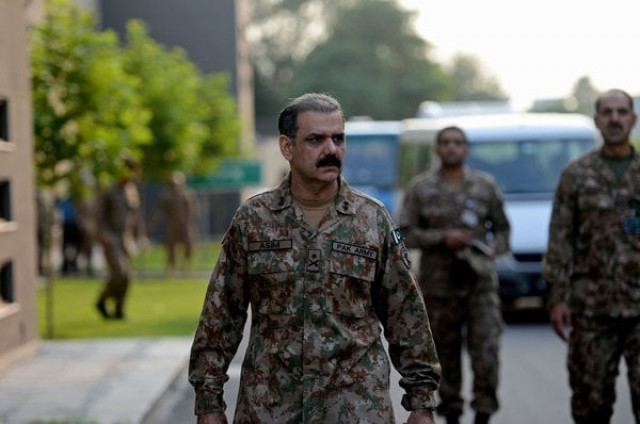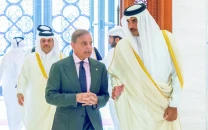Peace in Afghanistan: Army cautions against attempts to harm Murree process
Major General Bajwa says facilitating the process was a national decision

PHOTO: AFP
The Murree rendezvous has rekindled hopes for lasting peace in Afghanistan — thanks to Pakistan’s efforts to facilitate the landmark talks between Afghan officials and Taliban representatives in the popular tourist resort.
Nonetheless, the Pakistani military has cautioned that certain elements might try to sabotage the process as they feel peace in Afghanistan could undermine their interests.
Afghan officials met Taliban representatives on July 7 and 8 where the latter agreed to cease fire if Islamabad and Beijing guaranteed that a ‘united national government’ would be formed in Afghanistan. Kabul welcomed the meeting, officially dubbed as the ‘Murree Peace Process’, saying that it would help end bloodshed in the country. Officials from Pakistan, China and the United States also attended the meeting.
Read: Taliban, Afghan government talk 'peace' in Islamabad
“There are many detractors of the Afghan peace process. Peace in Afghanistan is in Pakistan’s interest and the Afghan government has the same interest. So, those people should be identified who believe this peace process doesn’t serve their interests,” Maj Gen Asim Saleem Bajwa, director general of the Inter-Services Public Relations, told The Express Tribune in an exclusive interview.
Asked about Pakistan Army’s stance on the Afghan peace process as some people in Afghanistan believe the army controls Islamabad’s Afghan policy, he said Pakistan Army did not think any differently from the rest of Pakistan.
“There is a political framework and a national thinking and Pakistan’s Foreign Office and the government represent it. The Pakistan Army also works in line with the same approach. It is a national decision. Every Pakistani is of the view there should be peace in Afghanistan and that the process should be Afghan-led and Afghan-owned so the Afghan government should have total control over the process and every segment should cooperate to serve this purpose.”
He said that the military and political leadership were completely on the same page vis-à-vis the country’s Afghan policy. “There shouldn’t be an iota of doubt about it. The political leadership says it will extend all possible help for the Afghan peace process. The military leadership says the same. And the Foreign Office also says the same thing,” the chief military spokesperson said.
Maj Gen Bajwa quashed the notion that any Taliban leader who wished to join the peace process was either killed or kidnapped in Pakistan. “I would categorically say there is nothing like this. Whoever has said this is not aware of the developments over the past one year. Pakistan is helping Afghanistan in the peace process,” he added.
Asked about the statements of some Afghan leaders that Pakistan has been in a state of undeclared war against Afghanistan for the last 20 years, the military spokesperson said Pakistan has never had such thinking. “Pakistan is not in a state of war with Afghanistan but Pakistan is helping Afghanistan out of the way to bring peace and stability in the country.”
Maj Gen Bajwa described the recent memorandum of understanding (MoU) between Pakistan’s Inter-Services Intelligence and Afghanistan’s National Directorate of Security as a good omen for cooperation. “If we want to bring peace [in Afghanistan], there is a need for enhanced cooperation at military and intelligence levels to correct things on the ground. So agreements and MoUs will be signed to make this a long-term process. All these steps are aimed at strengthening and implementing the process. So this MoU is very important and both sides would have done a lot of homework. I think there is no harm in it.”
When asked why relations between Islamabad and Kabul were not improving despite a thaw in relations following high-level political and military visits, he said the conflict between the two countries had been very old and complicated and it could take more time.
“Things are moving in the right direction. But it may take time. We may face challenges and challenges are coming even now as problems and issues are complicated and old. But we all should not forget the bigger picture – to achieve the political objective. We are working to achieve those objectives that include peace in Afghanistan and because of which peace in Pakistan. We keep on saying that these are inter-linked and we will achieve it.”
Maj Gen Bajwa said a major initiative was taken at political, diplomatic and military levels to improve to bridge the trust deficit. “We have seen unprecedented developments that include a visit to the GHO by Afghan President Ashraf Ghani during his Pakistan visit. Such things had never happened before. There were a series of visits by the political leaders, diplomatic teams, the army chief and the DG ISI,” he said.
Read: Post-Murree meeting: Afghanistan calls Taliban talks successful
The military spokesperson parried a question about the killing of two senior Pakistani militants who had joined the Islamic State, namely Hafiz Saeed Khan and Shahidullah Shahid, on Afghan soil and said Pakistan did not want to get embroiled in any controversy.
Nonetheless, he recalled that Islamabad had clearly conveyed to the Afghan government, its military and ISAF, the Americans and all others forces before launching Operation Zarb-e-Azb in North Waziristan Agency to take measures so the militants could not cross the border. “They [Afghan, foreign forces] should have stopped, arrested or killed the militants as it would have made things easy for them as they [militants] are monsters,” he added.
Published in The Express Tribune, July 13th, 2015.



















COMMENTS
Comments are moderated and generally will be posted if they are on-topic and not abusive.
For more information, please see our Comments FAQ